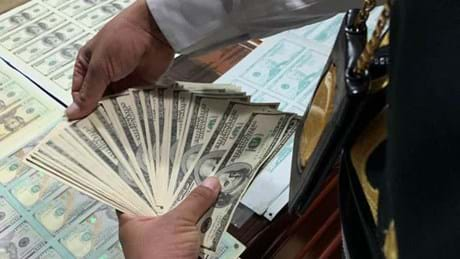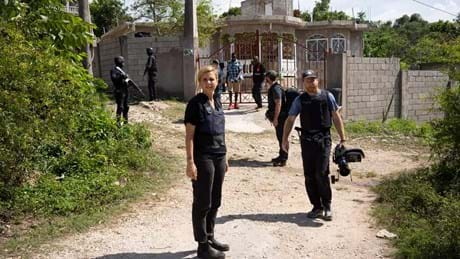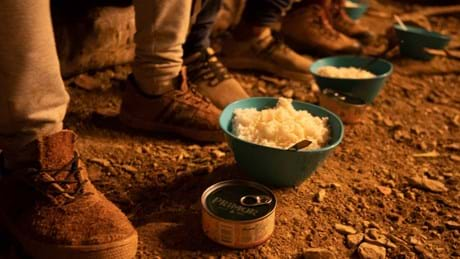DStv Compact Plus gets personal this March
05 March 2021Find out how DStv Compact Plus gets personal this March
Investigative journalist Mariana van Zeller answers 8 questions about her 8-episode journey through the criminal underworld
There are billion-dollar businesses worldwide run by people whose faces we never see. They aren’t even traded on the stock market. These are the shadow economies created by illegal activities like drug- and gun-running, sex trafficking, poaching, scamming, counterfeiting and the like.
Now investigative journalist Mariana van Zeller is taking us inside these deadly organisations to speak to people who make their living in the underworld in the 8-episode National Geographic (DStv 181) series, Trafficked: With Mariana van Zeller.
For some of her subjects, it was a way of flexing their power. Mariana reveals, “In Sinaloa [Mexico] alone, there are several different sorts of sectors or groups that belong to the Sinaloa cartel. So a lot of the times, they see this opportunity of being able to talk to National Geographic, a brand that is known all around the world, as a way to show force and show how they’re the most powerful, and in a lot of cases, that’s why they agreed to speak to us.”
We spoke to Mariana about what it took to make contact (which is something she shows us in detail in each episode), what it was like to be stood up by a contact, and what she’s learnt about these dark worlds…
1: How do you research something that is, by its nature, so deeply secretive?
It’s very hard. It’s one of the most challenging parts of my job, and my team’s job is gaining access to these worlds. We rely heavily on local journalists. They’re the unsung heroes in our society and in our line of work. They’re the ones who share their sources with us and they are our guides into these worlds. It’s months and months and sometimes even years of planning and knocking on doors and making phone calls and finding ways to gain access to these worlds. It’s not easy.
2: Who, in this series, put you through the most trouble to give you the least information?
(Laughs) Things fell through a lot and one of the scariest times that things fell through for me was on the first shoot. We were filming counterfeiters (in Peru) and it was the first time we went to the ground. We had sold Nat Geo on this series that is all based on access, I had the entire team with me and we showed up and they had ghosted us. They never showed up and we waited for hours and hours. I had to call Nat Geo and tell them this isn’t going to work. This scene didn’t work. It’s a failure, and it’s our first scene. I am incredibly thankful because they continued to trust and believe in us, in our show. So we started from scratch and a few months later, we were back in Peru and were able to gain access to these worlds. So it’s persistence. As a journalist, that’s the best tip or the best quality you can have is never giving up.
3: In Peru we see you wait over 3 hours for that counterfeiting contact. What did you do in that time?
I cursed! (laughs) No, I was a nervous wreck. We were all, me and my team, waiting in this van and we’d go and pace outside and then we’d come back. I was always hopeful. I always see the best in everyone in every situation, and I kept thinking they’re going to show up… they’re going to show up. We’d met them before. They told us they were going to be there. They’re going to show up. And then they never did. It was incredibly frustrating. Ditched on the second date!
4: Were there times when you were asked to leave your camera crew behind?
Yes, definitely. There was a situation in Mexico. It was late at night and we were trying to get access to these gun runners for the gun-trafficking episode. The guy who was sort of the leader of the cartel group there told us that the only way he would give us access is if I met him in person, by myself, with no cameras and no audio recording devices. We weren't sure. I was in a place that I’d never been in Mexico to meet someone that I hadn’t met before. But I had been assured that we knew somebody in common who’d put us in touch. And I knew in that situation it’s not in their benefit to harm us. So I decided to go and I met with him and it was a very uncomfortable situation. In these moments, we’re always trying to convince them that we’re journalists and not law enforcement. That’s always my job. But if you treat people with respect and empathy and with trust, they will treat you with respect and empathy back. And the next day we got access into that world. But it was difficult.
5: Was there someone in this series who saw the world in such a radically different way from you, to the point where it was hard to establish a connection?
In the episode we did on scammers, we spent time in Jamaica and Israel and saw both ends of scamming. In Jamaica, you can see how it’s motivated by lack of opportunities, and in Israel it was truly motivated by greed. Speaking to some of those scammers in Israel, it was hard to empathise sometimes. I could see the negative impact that they had and the people they were stealing from, really sad stories, and I felt there was not any remorse there. It was purely driven by greed. It was difficult at times to empathise.
6: When you were talking to people at the top of their black markets, did you find yourself thinking that they could really be successful in legal businesses?
It’s such an important detail that I hope people realise, these are incredibly talented individuals. Some of the best of the best at what they do. And in many situations, if they had only been given an opportunity, and if they had been born in a different part of the world or to a different body – because the inequality and poverty that leads a lot of people to these worlds falls heavily on the shoulders of minorities. I saw that again and again. If the situation was just different, they could be incredibly successful. So it is our responsibility as a society to figure that out and to find a way instead of having to force people into black markets, to give them a chance in life.
7: What’s been an intriguing development in one of these stories since you’ve finished production?
Well, I’m not sure if it’s intriguing but it’s incredibly depressing. Of the 3 gunmen that we filmed with the Sicarios for the gun story, 2 have since been killed. These were young guys, and it goes to show that even those that we consider to be some of the worst people because they’re hired killers, that it’s very hard for us not to empathise. Once I spent time with them and listened to their stories, I understood why they became who they are. I don’t agree with it, I don’t condone it, they do horrific things. But there is a saying in America: “Hate the sin, not the sinner.” And at the end of the day, when I found out that one was killed just a few months after we filmed with them, and the other one was just killed a couple of months ago, that was heartbreaking for me, anyway. Nobody is born wanting to be a criminal. They know full well that the life they’ve led ends very early on. And I don’t believe that if they had other opportunities, they wouldn’t have taken them. I know they would have.
8: Which of the edited episodes have you found the most impactful?
That’s like asking me to pick my favourite child – which is actually easy for me because I only have one kid, but in this case I have 8 episodes. But the guns episode is one that I’d been wanting to do. I’ve filmed and reported on guns and the impact they’ve had in America, and for a long time, I’ve wanted to do a story about how American guns are fuelling violence around the world. We filmed a pipeline of American guns all the way from here in Los Angeles, a few miles from my house, all the way down to Sinaloa, Mexico, and we saw first-hand the impact that American guns have. For me, it was a really important body of work that I can’t wait for people to see.
Watch Trafficked With Mariana van Zeller S1 from Thursday, 21 January, on National Geographic (DStv 181) at 21:00
PS: If you search online using the phrase, “Trafficked with Mariana van Zeller Podcast”, there are 8 companion podcast episodes that expand on certain aspects of the series. These can be streamed and downloaded free of charge on sites like podchaser.com
With the DStv App, the same channels you watch on your decoder at home are available for you to stream online at https://now.dstv.com/ or by using the DStv app on your phone.


